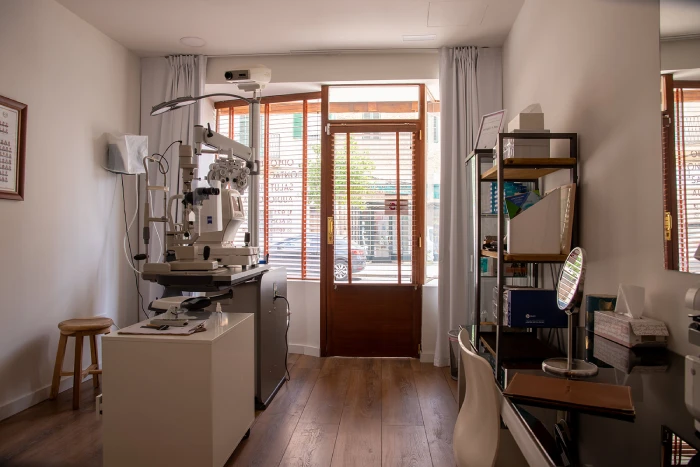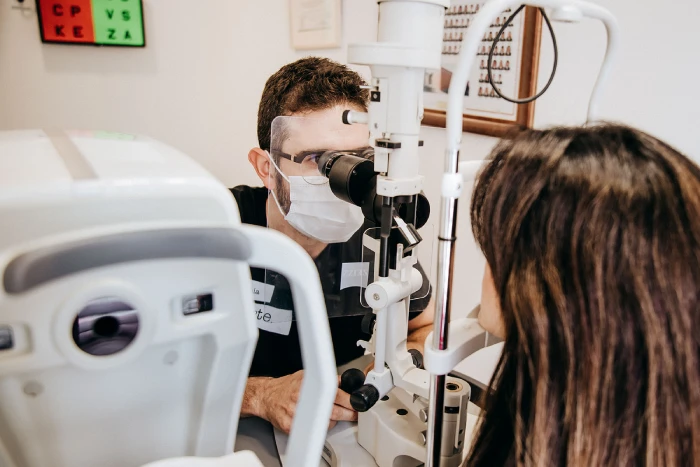If you want to take care of your eyesight, you should know about our optometry services in Mallorca.
What is optometry?
Optometry is the science that studies the visual system, its non-pathological changes and their solution, as well as the rules of visual health and hygiene.
Optometry is the medical speciality that deals with visual health. At our optician’s, the professional dedicated to providing this service is José Plasencia. As an optometrist, he is responsible for checking your eyesight and is qualified and authorised to diagnose problems related to visual health.
Optometry is the study of the theory and methodology required to understand the structure, development and function of the eye and visual system. Optometry is not only concerned with improving your visual health, but also with the prevention, treatment and rehabilitation of visual disorders.
What are the facts about global eye health?
More than one billion people worldwide are visually impaired because they do not receive the care they need for conditions such as nearsightedness, farsightedness, glaucoma and cataracts, according to the first World Vision Report published by the World Health Organization.
The report identifies ageing populations, changing lifestyles and limited access to eye care, particularly in low- and middle-income countries, as some of the main factors driving the increase in the number of people with visual impairment.
Other conclusions of the report include:
- The burden of eye disease and visual impairment does not fall equally on all people: it is often much higher for those living in rural areas, those on low incomes, women, the elderly, people with disabilities, ethnic minorities and indigenous populations.
- The unmet need for myopia treatment in low- and middle-income regions is estimated to be four times higher than in high-income regions.
- In low- and middle-income regions of western and eastern sub-Saharan Africa and South Asia, blindness rates are eight times higher than in all high-income countries. Rates of cataract and trachomatous trichiasis are higher among women, particularly in low- and middle-income countries.
- 14.3 billion is needed to address the unmet care needs of the 1 billion people living with visual impairment or blindness due to nearsightedness, farsightedness and cataracts.
What is short-sightedness or myopia?
Short-sightedness (myopia) is a visual defect that affects distance vision. There are various techniques to slow down the development of myopia when it is rapid and high, especially in children. The aim of myopia control is therefore to slow down or stop the progression of myopia as much as possible.
Sometimes, between the ages of 8 and 12, children develop myopia more quickly. It is therefore important to carry out myopia screening in these cases to prevent the development of severe myopia in children.
Myopia is the leading cause of visual impairment in developed countries and its prevalence is increasing worldwide. In fact, it is expected to affect 52% of the world’s population by 2050. Because of its increasing prevalence, the WHO has classified myopia as a global health problem since 2015. Imaging techniques are revolutionising the diagnosis of myopia complications, but is it possible to prevent them?
The truth is that it is.
Patients with a history of myopia should monitor their visual health from an early age with regular optometric check-ups.
Adults should be aware of the symptoms and risks associated with high myopia, such as retinal detachment.
You will be pleased to know that several studies have shown that spending more time outdoors can protect against the onset of short-sightedness.

What is an optometric screening?
In our optometry practice in Mallorca, we carry out check-ups for children and adults, assessing the following aspects
- Visual acuity: We check your maximum visual acuity and the detail of objects.
- Refraction: Various combinations are used to improve the quality of the image projected by the retina.
- Fixation: the ability of the eye to accurately maintain the stability of fixation on a point.
- Ocular motility: We measure spontaneous and coordinated eye movements.
- Accommodation: We check that the lens focuses on near objects and adjusts its shape to focus on distant objects.
- Visual perception: We interpret visual information according to our cognitive processes and prior knowledge, which influences our visual understanding.
- Binocular vision: integrates the images from both eyes into one for complete and accurate vision. Also known as stereopsis or the ability to see in 3D.
- Eye health: We assess visual quality based on a number of factors including tearing, blinking, eyelash direction and pupil activity.
It is important to take care of your visual health by having a check-up at our optician’s. Make an appointment now and discover how you can improve your vision.
